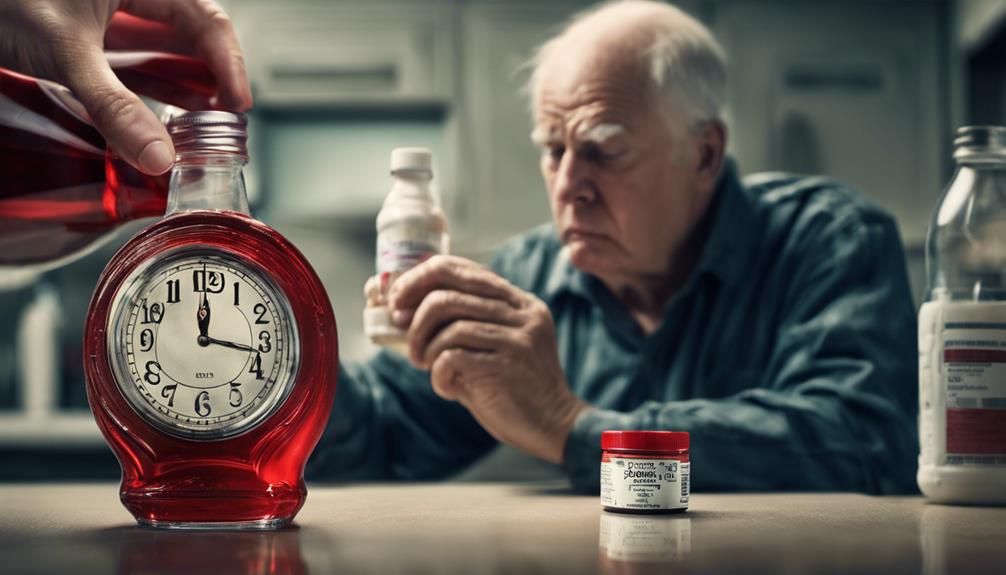Let’s explore the possible risks of giving your baby expired formula.
Have you ever wondered about the hidden risks that might be lurking in that seemingly harmless container?
The consequences could be more serious than you think.
Key Takeaways
- Using expired formula risks nutrient degradation and harmful bacteria exposure.
- Spoiled formula shows signs like unusual smell, color, or texture changes.
- Feeding expired formula can harm baby's health with potential bacterial illnesses.
- Proper disposal and avoidance of expired formula are crucial for baby's well-being.

Amazon Brand – Mama Bear Sensitivity Baby Formula Powder, 2'-FL HMO, for Fussiness & Gas when Sensitive to Lactose, Non-GMO, 22.5 oz, 1.4 pound (Pack of 1)
CONTAINS: One 22.5-ounce (1.41-pound) tub of infant formula milk-based powder with iron
As an affiliate, we earn on qualifying purchases.
As an affiliate, we earn on qualifying purchases.
Potential Dangers of Expired Formula
Using expired formula poses significant risks to your baby's health and well-being. It can lead to nutrient degradation and exposure to harmful bacteria or toxins. When formula passes its expiration date, the essential nutrients necessary for your infant's growth and development may start to break down, leaving the formula less nutritious.
Additionally, expired formula becomes a breeding ground for harmful bacteria that can cause food poisoning and gastrointestinal discomfort in your baby. These toxins can lead to serious health hazards, impacting your little one's delicate system.
It's important to prioritize your baby's health by checking the expiration date on formula containers diligently and disposing of any expired formula promptly. By being vigilant and attentive to the freshness of the formula you feed your baby, you can help safeguard their well-being and ensure they receive the necessary nutrition they need for healthy growth.

Termichy Stackable Formula Dispenser Portable Milk Powder Container, 2 Pack, Warm Grey
Independent Spout and Stackable Design: Each compartment of the formula dispenser is equipped with independent funnel, they can…
As an affiliate, we earn on qualifying purchases.
As an affiliate, we earn on qualifying purchases.
Signs of Spoiled Formula

Spoiled formula may exhibit telltale signs such as an unusual smell, color change, or inconsistent texture, indicating potential risks to your baby's health. When checking if the formula has gone bad, keep an eye out for the following signs:
- Unusual Smell: If the formula has a sour or rancid odor, it may have spoiled.
- Color Change: Any noticeable change in color, such as darkening or unusual tint, could indicate spoilage.
- Inconsistent Texture: Formula that appears lumpy, curdled, or has unusual thickness may not be safe for consumption.
- Separation or Clumping: Liquid formula that shows separation or clumping when shaken may have gone bad.

30 Pack Baby Formula Storage Bags Dispenser Disposable Baby Formula Container
Premium Quality & Safe: Our 30-pack baby formula storage bags are made from food-grade, BPA-free materials, ensuring the…
As an affiliate, we earn on qualifying purchases.
As an affiliate, we earn on qualifying purchases.
Health Risks for Babies
As parents, we must prioritize understanding the health risks associated with feeding babies expired formula to safeguard their well-being and development. Using expired formula can lead to nutrient deficiencies, exposing infants to potential harmful bacteria that may result in gastrointestinal upset, vomiting, diarrhea, weakness, and fever. These symptoms can lead to illness and pose significant risks, especially for immune-compromised or at-risk babies.
It's important to be vigilant for signs of discomfort in babies such as fussiness, nausea, vomiting, or diarrhea if they consume expired formula. By adhering to formula expiration dates diligently, we can guarantee our baby's safety and health. Remember, the consequences of feeding babies expired formula can be serious, so it's crucial to prioritize their well-being by providing them with safe and nutritious food options.
baby formula spoilage detection kit
As an affiliate, we earn on qualifying purchases.
As an affiliate, we earn on qualifying purchases.
Precautions for Using Expired Formula

To guarantee your baby's safety and well-being, it's crucial to take specific precautions when dealing with expired formula. Here are some essential steps to follow:
- Check the Expiration Date: Always look at the expiration date on the formula container to ensure its freshness and safety for your baby.
- Inspect for Signs of Spoilage: Examine the formula for any unusual odor, discoloration, or clumping, as these may indicate spoilage.
- Avoid Using Expired Formula: Don't risk your baby's health by feeding them expired formula, as it can lead to harmful bacteria growth and potential illness.
- Consult a Healthcare Provider: If you have inadvertently used expired formula or have concerns about your baby's health after consumption, seek advice from a healthcare professional promptly.
Proper Disposal of Expired Formula
When handling expired formula, prioritize your baby's health by promptly disposing of it to prevent any potential risks. Proper disposal of expired formula is essential to avoid feeding your baby degraded nutrients or harmful bacteria. Always check the expiration date on the formula packaging before use to guarantee safety. Even if the expired formula looks or smells okay, do not use it as the quality and safety may have been compromised. Following disposal guidelines for expired formula is vital for maintaining your baby's health and well-being.
| Proper Disposal of Expired Formula | Emotions |
|---|---|
| Dispose of expired formula promptly | Concern |
| Check expiration date before use | Responsibility |
| Avoid feeding degraded nutrients | Care |
| Prevent harmful bacteria intake | Vigilance |
| Follow disposal guidelines | Commitment |
Frequently Asked Questions
What Happens if I Give My Baby Expired Formula?
If we give our baby expired formula, it can pose serious risks to their health. This includes nutrient loss, potential bacterial contamination, and gastrointestinal issues.
It's important to always check the expiration date on formula containers and discard any expired formula. By doing so, we guarantee our baby receives the necessary nutrients for their growth and development while avoiding any potential health issues associated with using expired formula.
What Happens if Baby Eats Expired Baby Food?
If baby eats expired baby food, it can lead to digestive issues like vomiting and discomfort. The food may lack essential nutrients and could harbor harmful bacteria, risking your baby's health.
Prioritize checking expiration dates and never feed your little one expired food. Always prioritize safety and quality when it comes to your baby's nutrition.
What Happens if You Feed a Baby Formula That's Been Sitting Out?
If we feed a baby formula that's been sitting out for over 2 hours, harmful bacteria can grow quickly. This can put the baby at risk of getting sick from contaminated formula.
Symptoms like vomiting and diarrhea may occur due to bacterial infection.
To keep our little ones safe, it's essential to discard any formula left out for too long.
Does Baby Formula Expire if Unopened?
We're aware unopened baby formula can last up to 2 years if stored correctly. The expiration date guarantees best nutrition.
However, once past this date, the formula's quality diminishes. It's essential to check these dates to make sure safety. Expired formula can pose risks to your baby's health.
Always prioritize freshness for your little one's well-being.
Is it Safe to Join a Formula Feeding Support Group if I’ve Fed My Baby Expired Formula?
It’s crucial for the wellbeing of your baby to use unexpired formula. Consider reaching out to a formula feeding support group for guidance and support. They can provide valuable advice on feeding practices and resources to ensure your baby’s health and safety.
Conclusion
To summarize, it's important to never feed your baby expired formula to avoid potential health risks.
The risks of using expired formula, such as nutrient degradation and harmful bacteria formation, can have serious consequences for your baby's health.
Always check the expiration date, follow safe preparation and storage practices, and seek medical advice if your baby shows any signs of discomfort.
Your baby's health and well-being should always be the top priority.









